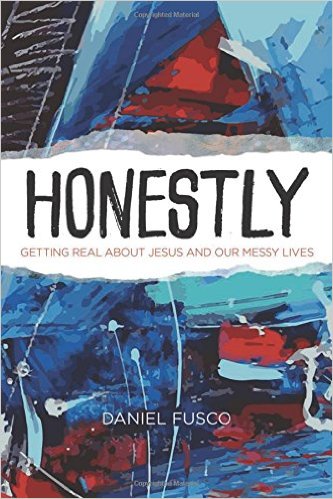Honestly, I don’t know that I would have picked up “Honestly” of my own accord.
At the risk of sounding arrogant, I probably would have passed Daniel Fusco’s book and thought I was beyond it. The back cover promises to help you “Find Jesus in your mess” and sort through the chaos of life. I likely would have rolled my eyes and continued searching for something a little more thought-provoking.
But while I’m thankful for writers who plumb spiritual depths and provoke new thoughts. there’s a danger in undervaluing something just because it’s simple and practical. Reading C.S. Lewis, John Piper or Richard Rohr might give me something to chew on in quiet moments. But life isn’t full of quiet moments; it’s full of noise and messes.
“Honestly” works under a deceptively simple thesis:
Life is messy. Jesus is real.
It’s easy to look at that as a slogan or a pithy bumper sticker saying. And certainly modern Christianity has no shortage of those things. But put alongside the context of life, it’s a promise that cuts through the noise and stills the soul.
In many ways, I’m living a life that I’ve always dreamed of. I have a beautiful wife and two great kids. We have a home we love in a quiet suburb. I have a day job that I enjoy, working for an organization I believe in. On the side, I get to write about film and faith, two subjects that I love. I do podcasts with friends and colleagues, which means a lot of my hobby time is spent with friends talking about movies. We go to a church we love and are slowly getting more involved there.
That’s the dream, right? Everything we want. And from a thousand yards away, it’s beautiful. But get up close, and it gets complicated.
I love my kids and would do anything for them. But they’re young. My oldest is 4 and my youngest is just 7 months. They wake up early and want to eat, watch TV or have their diaper changed. Twice a week, my wife and I have to both get up, get them dressed, get lunches packed and take them off to day care. It’s never easy. After that, I rush to my job, which is great, but often hectic and stressful as I pour over documents, looking for errors or try to write marketing copy (which is not my first language). My wife and I both work hard and still try to cover day care costs, car payments, groceries, diapers, formula, credit card bills and more, so a good portion of the week is spent with a wary eye on our bank account. After work, we try to get my 4-year-old to eat dinner, which can sometimes be a 60-minute hassle just for him to swallow one bite of chicken.
Following the dinner debacle, we try to get the kids to bed. The youngest is usually not a problem, but the oldest usually takes four or five attempts before he stays in his room. It’s about 8:30 or 9 p.m. by the time he’s finally asleep, but that often means the evening is just beginning. My wife, who provides freelance marketing support on the side, often has client work to finish up in the evening. I’m often trying to summon the mental strength to finish a blog post. Sometimes, if we’re lucky, we’re granted one last hour to collapse on the couch and watch a TV show before it’s time to go to bed and do it all over again.
On weekends, we do laundry.
What I just described above is a good day. Now toss in family drama. Scheduling issues. Car problems. Unanticipated bills. Sick kids. Grocery shopping. Home repairs. All of these things reliably come at the most inconvenient times, throwing our lives even further out of whack.
Now toss in my reaction to that. My short temper when things don’t go my way. My impatience. My selfish attitude, which bristles against anything that puts demands on my time or interrupts my plans. My laziness, pride and fear. Now slam that against the same flaws in every other person in my life. It’s a mess that crosses the internal and external, turning everything hectic.
Life is messy. Jesus is real. Two simple phrases, but ones I’ve found myself repeating over and over throughout the week. Simple doctrines that hold deep meaning and practicality.
The truth is, Fusco’s book is a bit of a mess, but I wonder how much of that is intentional. A jazz fan, he describes the book as an extended riff on Ephesians. But the book is far from expository; it leaps around and uses various passages as jumping off points to bolster its themes. The book is structured in four main sections and they meander through the epistle, often using a sentence as kind of a behind-the-scenes thought while tangentially sticking to its meaning. Those looking for a more systematic exploration of the letter might want to steer clear. And those looking for something more scholarly or pastoral might find themselves frustrated by Fusco’s casual writing style, which often veers off into lame jokes and illustrations that are only loosely connected to the section’s main themes. At one point, he introduces a jazz-based illustration comparing the Christian walk to the bass line in a song, but immediately follows it up with a second illustration about a contrarian friend that makes little sense. It can be something of a frustrating read.
And yet, there’s an undercurrent of grace and peace to it that anchors the entire affair. Which, again, may be intentional. After all, Fusco writes that grace and peace are our only hopes in this mess anyway. And the beautiful heart of Jesus, who forgives and makes beauty from messes, beats throughout the book. Even as I became frustrated at places, this thread drew me along.
And it’s a compelling metaphor. Because in our messes, it’s the beautiful, beating and graceful heart of Jesus that brings clarity to our messes, which is Fusco’s point in the end. It’s the light we focus on in the fog, and the voice we strain for in the din. And Fusco’s book constantly reminds of that.
I might not recommend “Honestly” for those looking for a hard-hitting theological tome. But for those struggling with life’s messiness and chaos, it’s a helpful and practical reminder.
This was written as part of the Patheos Book Club.













